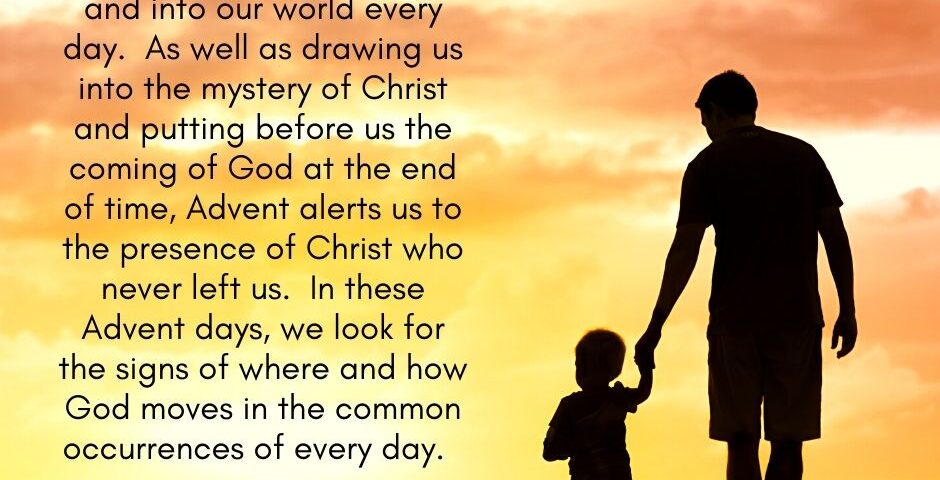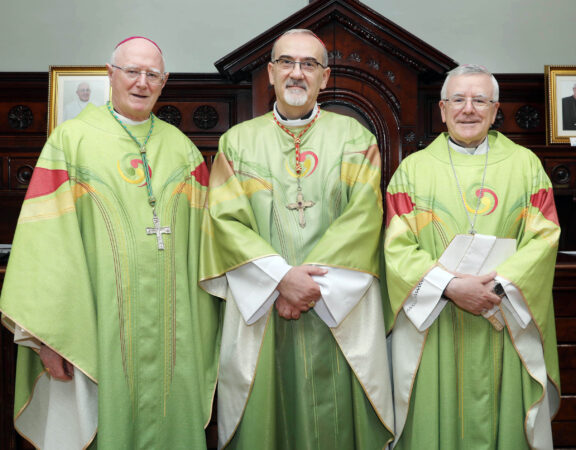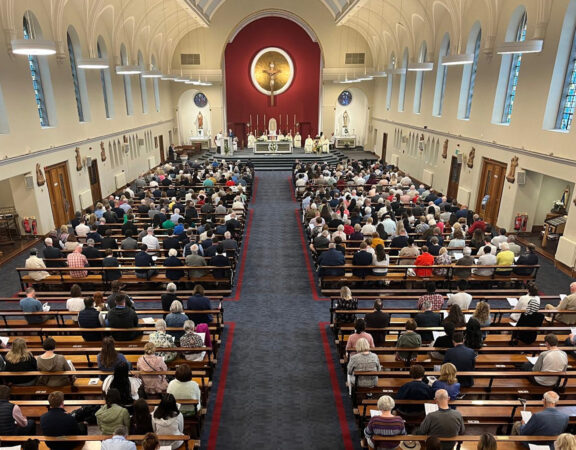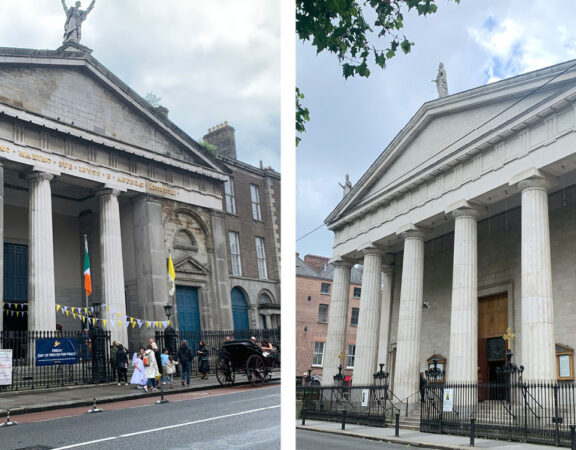Homily of Archbishop Dermot Farrell for the First Sunday of Advent
St Andrew’s Church, Westland Row
28th November 2021
Waiting In Challenging Times
There are many ways to wait. And waiting has moved to the centre of our lives in ways that we couldn’t have imagined two short years ago: the omnipresent waiting for Covid-19 tests, and then the waiting for the result. Now many are eagerly waiting for a Covid-19 booster. And there are other important dimensions to waiting: people with terminal illnesses waiting to depart this life, or people, very rooted in their communities, waiting for the arrival of a better world. There are families waiting for the contagion of drugs to be eradicated. Then, there is the farmer who sows a winter crop and must wait patiently throughout the Spring and Summer for the grain to ripen at harvest time. Or a woman expecting the birth of her child waits in a vastly different way to any of these: for her, it is a time of great longing, a time of hope. Her time of waiting and hoping is realised in the birth of the child and there is great rejoicing. Life teaches the farmer or the expectant parent how to wait. In a similar way, the life of faith also teaches us how to wait: to wait in joyful hope—to use the beautiful phrase from the Mass—for the coming of Christ, for the coming of God, for the fulfilment of life. Advent is the time the Church calls to mind that our God came to us in Jesus of Nazareth, and that God comes to us again and again in the events of our lives, in the silence of our hearts, in our Risen Lord, and will come again at the end of our lives, and at the end of time. As we remember, so we hope, as to how we remember shapes the way we hope. Our past and our future go hand-in-hand.
The God Who Comes—Every Day
As well as the mystery of the past and future coming of Christ—his coming in the flesh at Bethlehem, and the mystery of his coming at the end of time, there is a quiet third coming of our Lord. It is a time when we learn to perceive anew the Lord’s silent coming into our lives and into our world every day. As well as drawing us into the mystery of Christ and putting before us the coming of God at the end of time, Advent alerts us to the presence of Christ who never left us. In these Advent days, we look for the signs of where and how God moves in the common occurrences of every day. This is the human face of God whose Kingdom “is present wherever he is loved and wherever his love reaches us” (Spe salvi, 31). This is the God who offers a hope we cannot attain by ourselves. Being attentive to this day-by-day coming of God, we become, like Jesus, bearers of hope for those who find themselves wandering in the desert of disappointment and disillusion.
We might take time to marvel at God’s remarkable faithfulness to us, and towards all of creation. God created each one of us to harbour a sacred place within, a quiet space of welcome where only God may enter. This is God’s gift to every person. It is within everyone: as St Paul, echoing the prophet Isaiah said, “God has no favourites!” (Romans 2:11, cf. Matt 5:45). For people of faith, Advent is a time to turn with renewed attention to that sacred place, to open our hearts in new ways to the coming of God.
A Faith Response to the Drugs Epidemic
The God who comes to us, however, does not only come to us for ourselves. We would be untrue to the One who gave his life for us (see John 6:51), were we not—like him—to reach out to our sisters and brothers with compassion (see Luke 10:33). The daily news fills us with tales of oppression and poverty, and even in the midst of the pandemic, another ‘epidemic’—that of crack cocaine and the violence that follows in its wake. The causes of the crack cocaine epidemic we are experiencing in this city, and more widely across the country, are complex and deep-seated, but I believe, based on the goodwill and the many dedicated efforts of community groups, government and religious leaders, that these causes can be addressed and the plague of drugs, which rages out of control, can be effectively addressed if we all work together. It is a societal issue and societal issues require a societal response. The ‘normalisation’ of a drugs culture in Ireland is a major societal issue. For some people taking drugs has become as normal as having a drink. We cannot think of any group as “others” but rather we truly are fratelli tutti, as Pope Francis put it — all brothers and sisters inextricably connected to each other. If we lose that sense of interconnectedness, we also lose our sense of compassion, empathy and responsibility for each other.
The God who comes to us, comes to be with us. God’s presence among us is a saving presence. His is a saving presence because he calls us to change, and changes us from within—from the sacred place within our hearts (see Matt 6:3–4). Here is the source of our hope. The solution to the current drugs epidemic does not lie only in stemming the flood of illegal drugs, dismantling the drug gangs and cartels, more effective policing, reforming the criminal justice system, investment in historically disadvantaged areas, but it’s also a matter of character. The real response is not just a better drugs programme, but a willingness to journey with the families whose members are ensnared by unscrupulous peddlers of drugs, peddlers of death. To bring people back we need to accompany them. To quote Pope Francis, “to say this ‘no,’ one has to say ‘yes’ to life, ‘yes’ to love, ‘yes’ to others, ‘yes’ to education, ‘yes’ to greater job opportunities. If we say ‘yes’ to all these things, there will be no room for illicit drugs, for alcohol abuse, for other forms of addiction” (Address to the Participants of the 31st International Drug Enforcement Conference, 20th June 2014).
Christ is the way into that approach. As Advent progresses we prepare more and more to celebrate the birth of our Saviour. Born at Bethlehem, Christ never leaves us. In the resurrection, Christ is always with us (see Matt 1:23). The risen Christ is the Christ of Bethlehem today! The Feast of Christmas calls us to become more aware of his presence. Christ is present to us not only in the Word and Sacrament, but also in the people who surround us. He comes to us in those who are afraid, in those who are isolated and lonely in those who are ravaged by drug addiction and violence. It was Christ himself who said to us that “I was hungry and you gave me food…” (Matt 25:35-40). The Christ-child lying in a manger is but the beginning of the story. To be a Christian is to relate in a particular way to people who are weak.
There are people in this city, in the Church, in our schools, in our estates and in our families who are committed to the care of those afflicted by drugs. Such lives, marked by a striving to minister to those caught in the cycle of addiction, and to the little ones, testify that Christ and his Kingdom are close to us and that the Lord has not abandoned his people. In these days of Advent may we never cease to pray that his Kingdom may come, that justice and mercy be done. Come, Lord Jesus! Maranatha! Do not delay!
END








